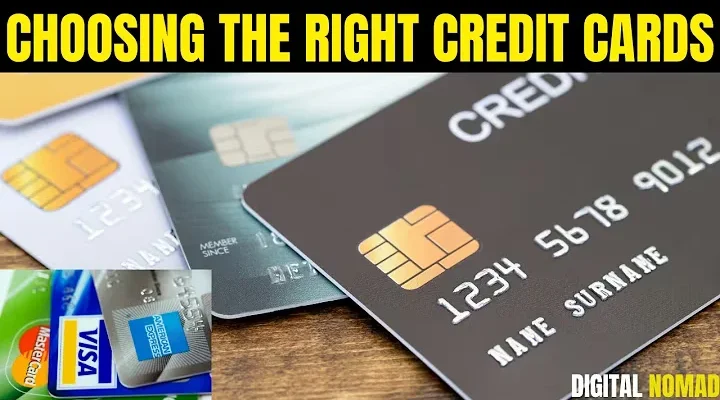Being a digital nomad or freelancer means freedom, flexibility—and a lot of financial juggling. From booking flights in Bali to paying for coworking spaces in Lisbon, your credit card isn’t just a payment method. It’s your financial lifeline. But not all credit cards are built the same, especially when you’re constantly crossing borders and earning in multiple currencies.
So, which credit cards are worth having in your digital toolbox? Let’s dive into the best ones that are tailor-made for this borderless lifestyle.
Must-Have Features in a Credit Card for Nomads
Low or No Foreign Transaction Fees
These fees can quietly drain your budget. Look for cards with zero or minimal foreign transaction charges. Every swipe should be cost-effective.
Travel Rewards and Points
Why not get rewarded for your globetrotting? Choose cards that let you rack up miles, points, or cashback every time you spend.
Global Acceptance
Make sure your card is part of major networks like Visa or Mastercard to avoid the embarrassment of getting declined in remote cafes or hostels.
Robust Fraud Protection
Digital nomads are often vulnerable to fraud, especially in unfamiliar countries. You need a card that alerts you instantly and protects your funds 24/7.
Mobile App Accessibility
You’ll be managing your finances on the go. A card with a powerful app lets you monitor transactions, freeze/unfreeze your card, and chat with support anytime.
Best Credit Cards for Digital Nomads
Chase Sapphire Preferred® Card
Why It’s Great for Freelancers
This card is a fan favorite for frequent travelers. You earn 2x points on travel and dining worldwide, making it perfect for those who work from cafés or travel constantly.
Fees and Rewards Overview
-
Annual Fee: $95
-
No foreign transaction fees
-
60,000 bonus points after spending $4,000 in the first 3 months
Capital One Venture Rewards Credit Card
Flexible Travel Benefits
Earn 2x miles on every purchase, every day. You can also redeem these miles for flights, hotels, or even Airbnb stays. Flexibility is its strong suit.
Miles vs Points Comparison
Unlike traditional points, Capital One miles can be transferred to over 15 travel partners. That means more ways to save.
American Express® Gold Card
Dining & Travel Perks
Ideal if your lifestyle revolves around food and travel. Earn 4x points at restaurants and supermarkets and 3x points on flights booked directly or via Amex Travel.
Membership Rewards Explained
Amex Membership Rewards are some of the most valuable in the industry, with options to transfer to hotel and airline partners.
Revolut Metal Card
Borderless Banking for Freelancers
A digital-first card that supports over 30 currencies. You also get global medical insurance and lounge access for delayed flights.
Real-Time Spending Alerts
Know where every dollar goes. Revolut’s app updates you instantly, so you never miss a beat—or a budget limit.
Wise (formerly TransferWise) Debit Card
Currency Conversion Without High Fees
Ideal for freelancers who get paid in different currencies. You’ll always get mid-market exchange rates, which are usually better than the banks.
Ideal for Freelancers Paid in Multiple Currencies
Hold and spend in over 50 currencies. Plus, there’s no monthly fee, making it a cost-effective option for budget-conscious nomads.
N26 You
Perfect for EU-Based Digital Nomads
This European challenger bank offers free withdrawals worldwide, travel insurance, and zero foreign transaction fees.
Transparent Pricing & ATM Access
Flat €9.90/month gets you a premium debit card with perks usually reserved for high-end credit cards.
How to Choose the Right Credit Card
Consider Your Travel Habits
Are you jet-setting weekly or sticking to one region for months? Your choice should reflect your travel pace and destinations.
Think About How You Get Paid
Getting paid in euros while spending in pesos? A multi-currency account or card like Wise can save you big on conversions.
Evaluate Annual Fees vs Rewards
Don’t be scared off by fees. Sometimes, the rewards more than make up for them—especially if you’re a frequent traveler.
Check Credit Score Requirements
Some premium cards require excellent credit. If you’re just starting, consider a no-fee starter card or a secured card to build your credit.
Tips to Use Credit Cards Effectively as a Nomad
Set Spending Alerts
Avoid nasty surprises. Real-time alerts keep your budget intact and help you detect fraud instantly.
Pay in Local Currency
Always choose to pay in the local currency to avoid dynamic currency conversion fees. It’s a simple tap that saves money.
Monitor Exchange Rates
Apps like Revolut and Wise let you lock in rates or get notified when they hit your target. Timing is everything.
Use Virtual Cards for Added Security
Especially when booking flights or accommodations online. Virtual cards help you avoid exposing your real card details.
Conclusion
The right credit card can make or break your nomadic lifestyle. It’s not just about points and perks—it’s about financial freedom, flexibility, and security. Whether you’re hopping from country to country or building a freelance empire from your laptop, a great card is your silent sidekick.
Pick the one that aligns with your lifestyle, spending habits, and future goals. Trust me, your wallet—and your passport—will thank you.
FAQs
1. What’s the best credit card for digital nomads with no credit history?
The Discover it® Secured Credit Card is a great starter option. No annual fee, cashback rewards, and it helps build your credit.
2. Are business credit cards a good option for freelancers?
Yes! Business cards like the Ink Business Preferred® from Chase offer higher limits and track expenses more efficiently.
3. Can I use travel reward points for business expenses?
Absolutely. Points can often be used to book flights or accommodations for business travel—just track them properly for tax time.
4. What should I do if my card gets blocked abroad?
Always notify your issuer before traveling. If blocked, contact customer service via the app or their international number to unblock it.
5. Are prepaid cards better than credit cards for international travel?
They’re safer for budgeting, but they don’t offer the same rewards or fraud protection as credit cards. Use them as a backup, not your primary tool.
💰 Want to Make Money Online?
Join our WhatsApp Channel for proven tips on side hustles, passive income, affiliate marketing, and more!
🚀 Join Now & Start Earning!


